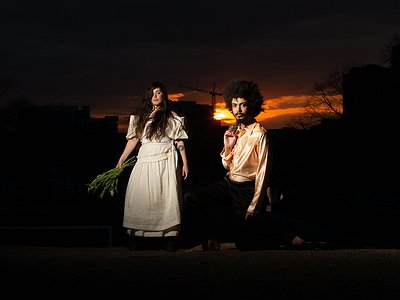Part 2
Take us through a day in your life, from a possible morning routine through to your work, please. Do you have a fixed schedule? How do music and other aspects of your life feed back into each other - do you separate them or instead try to make them blend seamlessly?
L: In my waking life, I try and walk in nature for the first hour that I’m awake; gently connecting to a larger grid followed by writing and if I’m lucky something delicious. I prefer to play music and practise in peak day time when my mind feels most alert; the night time has always held a special place for gestating ideas and riffing all kinds of wild with family strangers and friends.
J: My routine is Work, Play, repeat.
Can you talk about a breakthrough work, event or performance in your career? Why does it feel special to you? When, why and how did you start working on it, what were some of the motivations and ideas behind it?
L: I think my greatest breakthroughs have come when I’m alone listening in silence, walking or practising; if I’m lucky an essential truth will just worm its way through me like an amulet, I’m given another piece that accumulates to a larger whole.
J: Every project is its own breakthrough. I’m so thankful mine have led to Ecstatic music with Romy.
There are many descriptions of the ideal state of mind for being creative. What is it like for you? What supports this ideal state of mind and what are distractions? Are there strategies to enter into this state more easily?
L: For creativity it’s essential to shift into more childlike modalities; a huge part of this paradigm is the role of curiosity; exploring something just for sake of the experience; what does this taste or sound or feel like? After a certain age, most of us are coming from the modality of anxiety about the need to completely understand or avoid punishment.
J: It’s important for me to work against my feelings. Creativity is like physical exercise with its covertly increasing returns.
Music and sounds can heal, but they can also hurt. Do you personally have experiences with either or both of these? Where do you personally see the biggest need and potential for music as a tool for healing?
L: Exploring frequencies with tuning forks is a wonderful way to align with ourselves.
There is a fine line between cultural exchange and appropriation. What are your thoughts on the limits of copying, using cultural signs and symbols and the cultural/social/gender specificity of art?
J: I tend to think the line between cultural exchange and appropriation is actually quite distinct. The spheres of hyper-consumerist cultural exchange in which our industries operate certainly do exploit asymmetrically and have entangled and thereby commodified our Arts beyond recognition, however, we must never forgo our creative freedoms. If Artists are even capable of exploiting culture at all then we should no longer be called Artists but rather Exploiters, wholesale. Food is the last frontier. The culinary arts perfectly illustrate the fallacy. A cook misrepresenting and bastardizing a culture to capitalize off of a market is an obvious, glaringly ugly problem that nourishes nobody. That is a scammer with no interest in beauty. That lack of integrity or passion is easy to distinguish across all art forms. Such inauthentic endeavours fail inevitably, indubitably... “cultural appropriation” in Art is a neo-segregationist notion and I have no interest in division of any kind. Culture for all, forever.
Our sense of hearing shares intriguing connections to other senses. From your experience, what are some of the most inspiring overlaps between different senses - and what do they tell us about the way our senses work?
J: All of my wires are crossed. Our senses illustrate being in a cute way. The emotions that sound can elicit are quite profound. Among the deepest, highly accessible manifestations of life.
Art can be a purpose in its own right, but it can also directly feed back into everyday life, take on a social and political role and lead to more engagement. Can you describe your approach to art and being an artist?
L: I do believe that artists are here as some sort of mouthpieces/various modulators for the experience of life; primarily the human one. I find that really good art has a way of taking complex/nuanced things and morphing them into a shared universal language and when its misunderstood that makes it even better; it becomes like ink-blot cloud formations for the perceiver.
What can music express about life and death which other forms of art may not?
A unique aspect of music is that it's a keeper of time. When one is playing or singing it's always within the time space continuum, so that’s a real mortal piece. The fact that music can also be its own language expressed through sound and time allows us to access ways of knowing that precede language and words.





